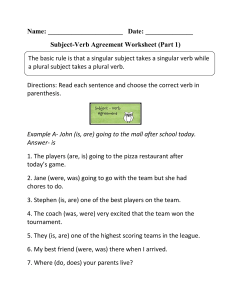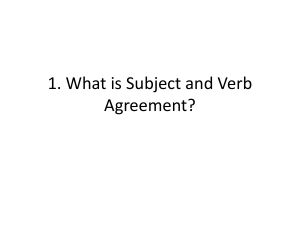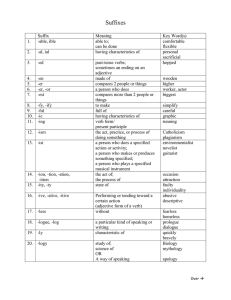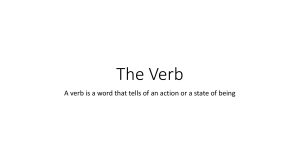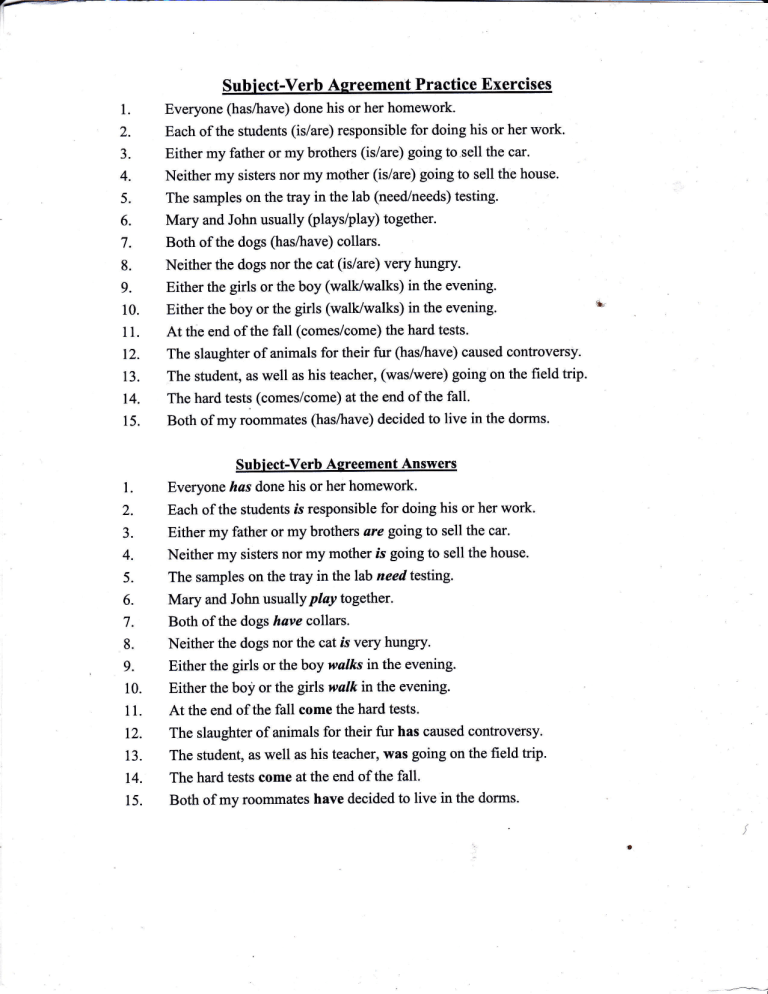
Subiect-Verb Agreement Practice Exercises l. 2. 3. 4. 5. 6. 7. 8. 9. 10. 11. 12. 13. 14. 15. Everyone (haslhave) done his or her homework. Each of the students (is/are) responsible for doing his or her work. Either my father or my brothers (is/are) going to sell the car. Neither my sisters nor my mother (is/are) going to sell the house. The samples on the tray in the lab (need/needs) testing. Mary and John usually (plays/play) together. Both of the dogs (has/trave) collars. Neither the dogs nor the cat (is/are) very hungry. Either the girls or the boy (walk/walks) in the evening. Either the boy or the girls (walk/walks) in the evening. At the end of the fall (comes/come) the hard tests. The slaughter of animals for their fur (haslhave) caused controversy. The student, as well as his teacher, (was/were) going on the field trip. The hard tests (comes/come) at the end of the fall. Both of my roommates (has/have) decided to live in the dorms. Subi ect-Verb Agreement Answers l. 2. 3. 4. 5. 6. 7. 8. 9. 10. 11. 12. 13. 14. 15. Everyone has done his or her homework. Each of the students l's responsible for doing his or her work. Either my father or my brothers are goingto sell the car. Neither my sisters nor my mother is going to sell the house. The samples on the tray in the lab need testing. Mary and John usually play together. Both of the dogs have collars. Neither the dogs nor the cat r's very hungry. Either the girls or the boy walks in the evening. Either the boy or the girls walk in the evening. At the end of the fall come the hard tests. The slaughter of animals for their fur has caused controversy. The student, as well as his teacher, was going on the freld trip. The hard tests come at the end of the fall. Both of my roommates have decided to live in the dorms. L Answer 1. Annie and her brothers are at school. 2. Either my mother or my father is coming to the meeting. t 3. The dog or the cats are outside 4. Either my shoes or your coat is always on the floor. 5. George and Tamara don't want to see that movie. 6. Benito doesn't know the answer. 7. One of my sisters is going on a trip to France. 8. The man with all the birds lives on my street. 9, The movie, including all the previews, takes about two hours to watch. lFf i i 10. The players, as well as the captain, want to win. Có' ,l 11. Either answer is acceptable. v 12. Every one of those books is fiction. iPol 13. Nobody knows the trouble I've seen. 14. Is the news on at five or six? 15. Mathematics is John's favorite subject, while Civics is Andrea's favorite subject. 16. Eight dollars is the price of a movie these days. 17. Are the tweezers in this drawer? 18. Your pants 19. There are at'the cleaner's. were fifteen candies in that bag. Now there is only one left! 20. The committee debates these questions carefully. 21. The committee lead very different lives in private. 22. The Prime Minister, together with his wife, grcets the press cordially. 23. All of the CDs, even the scratched one, arc in this case. -l SUBJECT VERB AGREEMENT - RULES _ Here are some more guidelines for subject verb agreement. 1 .When two singular subjects are joined by the words or or nor a singular verb is in ordea My sister or my brother is meeting you at the airport. 2. Two singular subjects joined by either/or or neither/nor also need a singular verb. Neither Carla nor Jeff is available to meet you at the airport' Either Angie or Jeff is meeting at the airport. 3. When the word and connects two or more nouns or pronouns, use a pluralverb. She and her family are at Disney World. 4. When a compound subject contains both a singular and a ptural noun or pronoun joined by or or !!9I, the verb should agree with the part of the subject that is nearer the verb. The athlete or his teammates sprint every day. His teammates or the athlete sprints every day. 5. When a phrase comes between the subject and verb, the verb has to agree with the subject, not with the noun or pronoun in the phrase' Two of the puppies are whimPering. The birthday boy, along with his friends, is anxious for the party to stop. 6. Since doesn't is a contraction of does not it should be used with a singular subject. Mary doesn't care for pizza. Don't is a contraction of do not and requires a plural subject. They don't know the waY home. 7. Each, either, each one, everyone, neither, everybody, anyone, anybody, somebody, nobody, someone, and no one are singular so they need a singular verb. Each of the girls is qualified for the prize. Neither knows how the competition will end. 8. Sentences that begin with there is or there are have the subject foltowing the verb since there is not a subject. Therefore, the verb must agree with what follows There are many paths to success. There is one road out of town. it. A predicate adjective modifies the subject of the sentence, and is connected to the subject by a linking verb. In the sentence "The wall is purple," the subject is "wallr" the predicate adjective is "purple" and the linking verb is "is." Predicate Adjectives in Sentences Here are some examples of predicate adjectives used in sentences. The predicate adjective is in bold type. Children grow older every day, The baby remains happy during her bath. Her lasagna smells scrumptious. ltalian. a Andy's sports car is a Bosses can be a His horses appear a Mount Rushmore looks amazing. He seems demanding. well-groomed. afraid of the dog. a All the kittens are asleep. a His assignment proves a Tornadoes appear menacing. a My neighbors are Japanese. a Our music sounds uplifting. a Her costume is strange. The director remains The ocean was difficult for him, hopeful, in spite of bad reviews. aglow from the setting sun. Traffic becomes congested after work. The senator was long-winded. wrong. a My first impression was a Mary would be a My doctor seems a The disease is wide-spread. a Aspen leaves turn pefect for him. confident about my recovery. yellow in the fall. 10 3. Furthermore, you should not place a hyphen in a compound adjective if the adjectives are capitalized, such as when they are part of a title. Correct: His book was entitled, "Gender Neutral Language in English Usage," and it revolutionized the way people think about sex roles. However: His book on gender-neutral language revolutionized the way people think about sex roles. Correct: The students were participants in Chicago-Kent's vaunted Legal Research and Writing Program. Examples of compound adjectives 1. This is a four-foot table. 2. Daniella is a part-time worker. 3. This is an all-too-common error. 4. Beware of the green-eyed monster. 5. He is a cold-blooded man. 6. I love this brightlyJit room! 7. Danny's dog is well-behaved. 8. You have to be open-minded about things. Compound adjective exerc¡ses 1. From each group, choose the sentence that contains a compound adjective: A. Sheila was horribly moody. B. We'd like you to be part of the decision-making process. c. The company showed steady improvement in their stock trades. A. This is a widely used procedure for finishing wood floors. B. Moths ate his woolen socks. C. That was really generous of you. A. B. Sharon's adopted son is five years old today. My new car has leather upholstery. Subiecü & Verb r:t- !!Agreenrent Key the subject and verb agreement means matching J correctf ormof tne6uject;íththe-correctf qtq-"f-!h:,Y:t-l^S19jil^t:o':ff ,nofr,'Jn'fil"5lll,:,rl:T;;;iih;'u",b.-prurur subjecrs so with rhe ptural rorm or the verb. rf you match. if the subiect qrd verb tn" ,"ñt"n." out nüá, ;;r;át tle aure to teil *v CORRECT: - The PuPPies arecute. Since puppiesis plural, it would -sound funny to'use the singular verb form, rir correct): The PuPPies 6cute' (NOT Since boY is singular, it would to use the Plural. sound funnY-walk (NOT correct): verb form, The boy wa¡lkhome from school' CORRECT: The boy reltc home from school' are singular, they ** The subjects..you,, and..I,, do not foilow the rure. Even though they plural subjects' maicttéá w",th the same verb form as Ghoosethecorrect'formoftheverbtomatcheachsubject. (sing/sings) sings 1. He 2. They (talVtalks) 3. My mom 4. Uncle Bob 5. We 6. You talk 11' The boys (see/sees) t2. Sarah (read/reads) reads 13. JimmY (PainVPaints) oaints t4. The dog (barlVbarks) barks (play/plays) plav 15' My friend (visiVvisits) (write/writes) write 16. She (draw/draws) 7. They (clean/cleans) clean t7. It (work/worK) lessica (wallVwalks) walks 18. The car (run/runs) runs 8. The cats (nap/naps) nap 19. You (jump/jumPs) iumP -- 9. 10. We(watch/watches) watch (siVsits) sits (eaVeats) eats 20. I (travel/travels) travel. are COMPOUND ADJECTIVES work A compound adjective is formed when two or more adjectives be hyphenated to together to modify the same noun' These terms should avoid confusion or ambiguitY. had been lncorrect: The black and blue mark suggested that he involved in an altercation. been Gorrect: The black-and-btue mark suggested that he had involved in an altercation. to the lncorrect: Her fifteen minute presentation proved decisive outcome of the case. the Gorrect: Her fifteen-minute presentation proved decisive to outcome of the case. in "ly") and an adjective However, combining an adverb (usually a word ending required because it is already does not create u iótpornd adj'ective. ruo rryptren is the subsequent noun' clear that the adverb modifies the adjective rather than lncorrect: The remarkably-hot day turned into a remarkably-long week. long week' Gorrect: The remarkably hot day turned into a remarkably 2 L\
